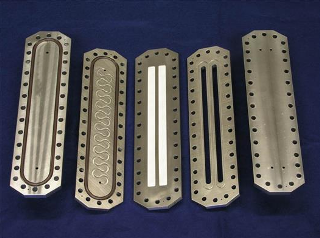Feb 29 2016
The German Research Foundation (DFG) funds a new research group at Karlsruhe Institute of Technology (KIT) and the University of Freiburg: “Acquisition and control of dynamic local process states in microreactors by latest in-situ sensors”, briefly called ProMiSe. Scientists are to develop electronic and optical microsensors and measurement technologies to better understand chemical and physical processes in microstructured process technology systems, to reduce the costs of these processes, and to make them more energy-efficient.
 Channels or other flow structures inside of compact microreactors optimize mixing of chemicals and heat removal during processes. Credits: IMVT/KIT
Channels or other flow structures inside of compact microreactors optimize mixing of chemicals and heat removal during processes. Credits: IMVT/KIT
KIT coordinates the new research group (FOR 2383 ProMiSe). Its spokesman is Professor Roland Dittmeyer, Head of the Institute for Micro Process Engineering (IMVT) of KIT. For the first three years, the research group will be funded by the DFG with EUR 2.7 million.
Microreactors are modularly designed, compact process technology systems. Substances are passed through microchannels of smallest dimensions of a few micrometers (millionths of a meter) only. Thanks to the surface area that is very large in relation to the reaction volume, microreactors are characterized by an improved heat transfer. The small dimensions of the microchannels also accelerate mixing. Moreover, use of microreactors makes processes safer, in particular when using extremely toxic substances or reactions tending to explode, because smaller quantities of substances can be used in distributed production runs.
So far, local processes in such microstructured systems have not been understood completely. This particularly applies to multi-phase reactive flows of two or several phases or fluids (liquids or gases). “Better data, i.e. spatially and temporally resolved data on chemical reactions, substance transport processes, and phase transitions, as well as consistent modeling are needed to make these processes more efficient,” Professor Roland Dittmeyer, KIT, spokesman of the ProMiSe group, explains. “As a result, consumption of substances and energy and the amounts of waste produced can be minimized, process costs are reduced, and environmental compatibility is enhanced.”
With the help of electronic, electrochemical, and optical microsensors for the real-time measurement of process parameters, which are integrated into the difficult-to-access microchannels, researchers now want to determine data of an entirely new quality and use them as a basis for improved understanding of the process.
Apart from the IMVT (Professor Roland Dittmeyer and PD Dr. Jürgen J. Brandner), the KIT Institute for Technical Thermodynamics and Refrigeration (ITTK – Professor Michael Türk) and the KIT Institute for Applied Materials – Materials Science and Engineering (IAM-WK – Professor Thomas Hanemann) are involved in the ProMiSe project. On the part of the University of Freiburg, the Chairs for Design of Microsystems (Professor Peter Woias as deputy spokesman of the research group and Dr. Keith Cobry), the Chair for Sensors (Professor Gerald Urban) and the Chair for Simulation (Dr. Andreas Greiner) as well as the Gisela-und-Erwin-Sick Professor for Microoptics (Professor Hans Zappe) of the Department of Micro Systems Engineering participate in the project. As associated working groups, the KIT Institute of Organic Chemistry (IOC – Professor Stefan Bräse, Dr. Nicole Jung) and the KIT Institute of Functional Interfaces (IFG – Professor Andrea Schäfer) take part in ProMiSe.